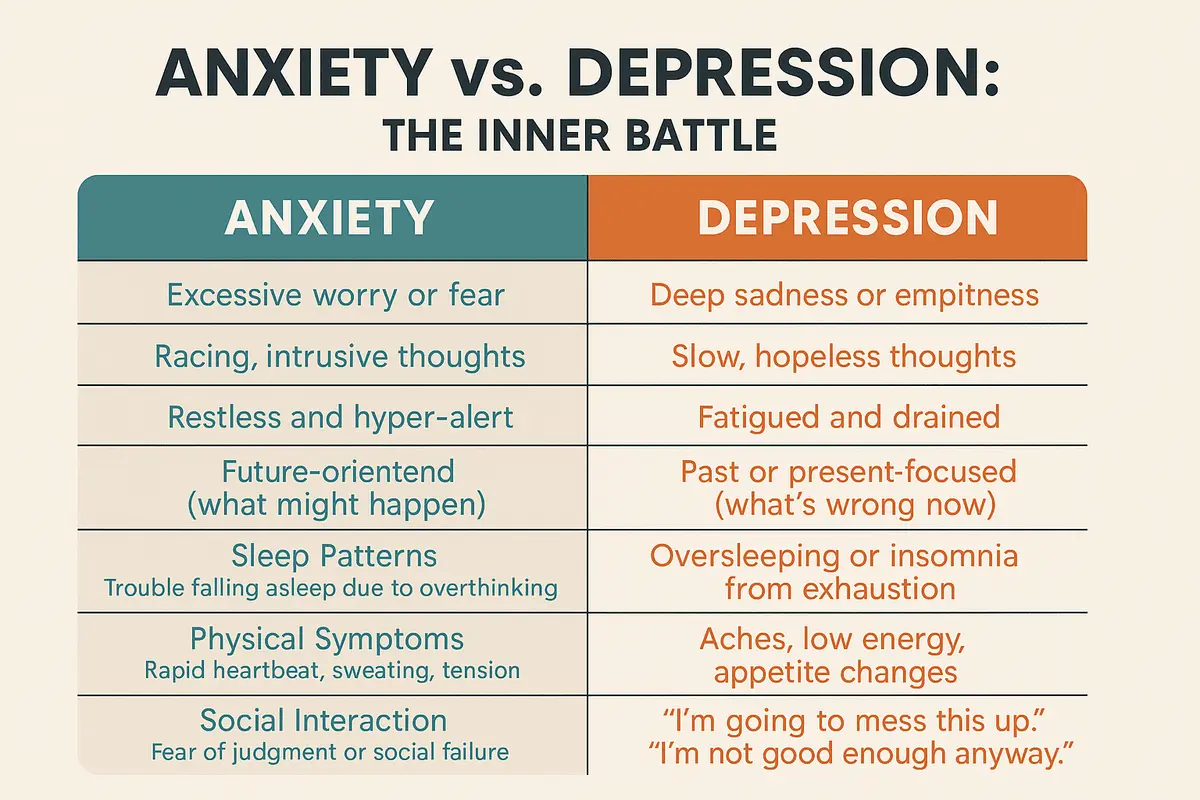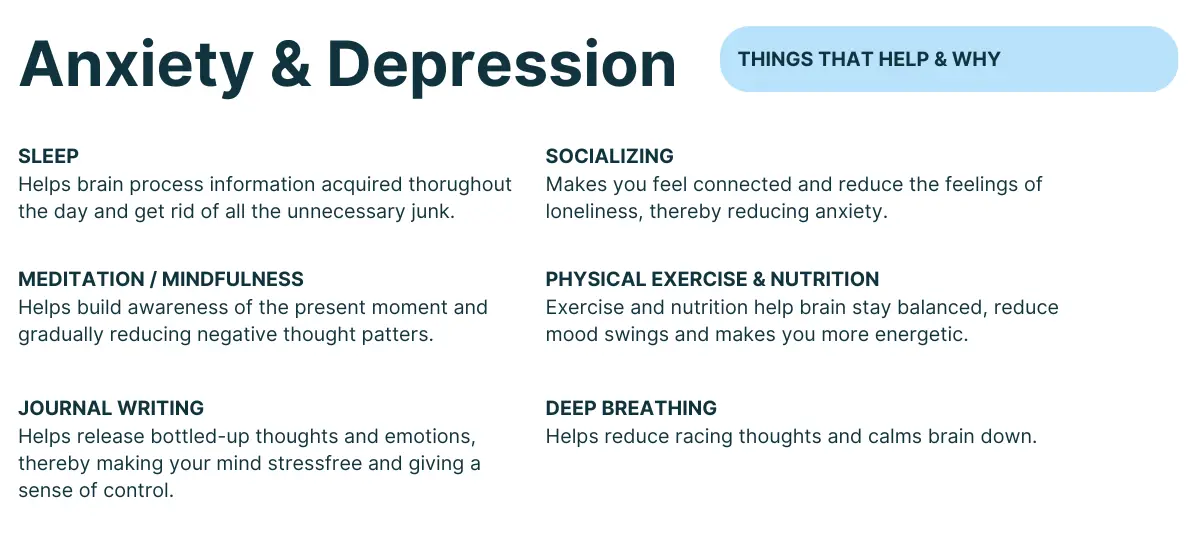Let’s get one thing straight — depression is not sadness. And anxiety is not nervousness. It’s way deeper than that. Anxiety and depression are both interrelated and can make our lives suffer if we don’t handle them well.
Depression is when your mental self finally snaps and tells you:
“Fuck you. I’m done pretending to be the person you made me into.”
It happens when, for a long time, you’ve been ignoring your own voice. You’ve made plans – big ones. Maybe about your career, your habits, your health, the kind of life you wanted to live.
But what happened next?
You delayed. You postponed. You convinced yourself that “tomorrow” is better. And after a hundred tomorrows, nothing moved. The idea stayed an idea. The plan never became an action.
That constant mismatch between what you KNOW you’re capable of, and what you’re actually doing, creates a slow, painful death inside your mind. That’s depression.
The Invisible War: What Depression Really Feels Like
Depression isn’t just being sad on a Sunday. It’s a persistent state of emotional exhaustion. You’re not crying all day, but you’re not feeling anything either. The world starts to lose its taste. Things that once made you excited feel distant. Food tastes bland. Music sounds flat. Colors seem dull. Gaming is no longer fun. Talking exhausts you. Your laugh is fake. You weep without a single tear.
You wake up tired, not because your body didn’t rest, but because your soul didn’t.
You scroll through your phone to numb your thoughts. You sleep too much or too little. And sometimes, you get through the whole day without saying more than five words.
And worst of all, you start to feel guilty. Guilty for being like this. Guilty for not being able to “snap out of it.” Guilty of disappointing people. And that guilt deepens the cycle.
Anxiety: The Constant Buzzer in Your Brain
If depression is numbness, anxiety is hyper-awareness. It’s your brain constantly buzzing with imaginary problems, overanalyzing every detail, every sentence, every facial expression, every gesture from friends, every possibility of failure.
You imagine the worst-case scenario in everything, even when things are going fine. Your brain doesn’t let you rest. It builds a narrative of constant fear and pressure:
- “What if I say something stupid?”
- “What if I fail again?”
- “What if they don’t like me?”
- “What if I never get better?”
You feel the weight of the future on your chest. You fear that everything could go wrong – even if it’s been going right. That’s anxiety.

And the worst part? Anxiety and depression can and often do coexist.
You overthink everything, yet you do nothing. You fear wasting your life, yet you’re too mentally exhausted to live it.
Why the Loop Never Ends
Here’s the truth that you may or may not have realized by now:
You get a burst of inspiration, maybe after watching a motivational video, and decide you’ll fix your life in a week. You write out this intense morning routine, start reading self-help books, decide to hit the gym every day, and quit your bad habits cold turkey.
By Day 2, you’re already falling behind. And by Day 3, you hate yourself again.
Your brain doesn’t trust you anymore – not because it hates you, but because you’ve broken promises to yourself too many times.
When you say, “From now on, I’ll read 4 books this month,” but you haven’t touched a book in years, your brain calls bullshit. When you say, “I’ll quit smoking starting tomorrow,” but you’ve failed 6 times before, your brain doesn’t buy it.
Imagine a friend who has broken your trust and promises almost every time, would you keep trusting him again? You need to earn your brain’s trust if you want to achieve your goals.
How to Rewire Your Mental Circuit
Let’s take some real-world examples.
Building a Habit Like Reading:
Instead of planning 4 books a month, plan to read one paragraph a day. That’s it.
Sounds too easy? That’s the point. Your goal shouldn’t be to finish a book. Your goal should be to teach your brain that “we show up every day, no matter how small it feels.“
This helps your brain trust you and develop a habit, no matter how small.
One paragraph becomes one page. One page becomes a chapter. But only after your brain starts believing you’re serious.
Quitting Smoking or Any Addictive Behavior:
Same logic.
Let’s say you smoke 10 cigarettes a day. Don’t try to drop to zero. That’s shock therapy, and it almost always backfires.
Instead, set a ceiling: “No more than 9 cigarettes a day for 2 weeks.” Your brain won’t resist that. It won’t go into panic mode. The goal here is to go for the absolute minimum required, until your brain gets used to trusting you and you start developing a disciplined life.
After 2 weeks, make it 8. Then 7. You don’t crash your way into quitting — you slide out of it.
And make sure the nicotine content stays consistent (same brand) to avoid unexpected withdrawals.
Depression Is Not Laziness. Anxiety Is Not Weakness.
You’re not lazy. You’re mentally drained.
You’re not weak. You’ve just been in fight-or-flight mode for too long.
And no, it’s not always about childhood trauma or some dark past. Sometimes it’s just the accumulation of a hundred ignored instincts, a thousand unexpressed emotions, and a life that doesn’t feel like yours anymore.
We live in a world that keeps telling you to be more, do more, achieve more, but it never teaches you how to rest, how to feel, how to heal. And that’s where this two-faced monster — depression and anxiety, takes over.
Things That Actually Help
Forget the 30-day challenges for a moment. Let’s talk about things that actually work:
- Sleep like it’s sacred. Your brain detoxifies itself during deep sleep. Guard it.
- Walk. Not run. Walking clears the mental fog. Aim for 20–30 minutes a day, no headphones.
- Eat for stability, not stimulation. Avoid sugar spikes and junk. Your gut health impacts your mood.
- Say no.Stop saying yes just to please people. Boundaries are mental armor.
- Do something small but real each day. Like cleaning your room, journaling your thoughts, or drinking water first thing in the morning.
- Talk to someone you trust. Don’t wait till you hit rock bottom.

You don’t need to “be productive.” You need to be aligned. And that only happens when your actions reflect your truth, not society’s, not your parents’, not Instagram’s.
If You’re in That Dark Place Right Now
Let me tell you something people rarely do:
You’re not broken. You’re not behind. You’re not failing at life.
You’re just mentally tired from fighting a battle no one can see.
But this version of you, this emotionally worn-out, confused, numb, anxious version — is not the final version.
This is the transition. This is the part where you learn to stop lying to yourself. This is the part where you drop the mask, look in the mirror, and say:
“I want to feel like me again.”
Not for social media. Not for your parents. Not for your job.
For you.
Start small. Stay honest. And if all you did today was survive, that’s enough.
Because the real comeback begins the moment you stop pretending and start listening to the part of you that’s been quietly whispering:“Please don’t give up. I’m still here.”
Understand how overthinking can increase your anxiety and make your life miserable with depressive thoughts.

